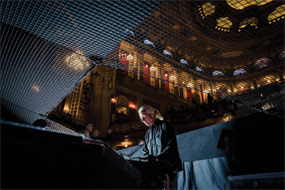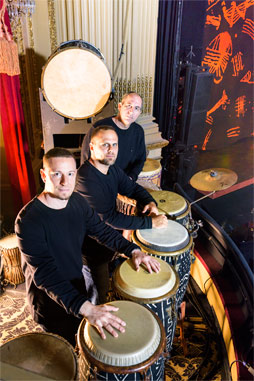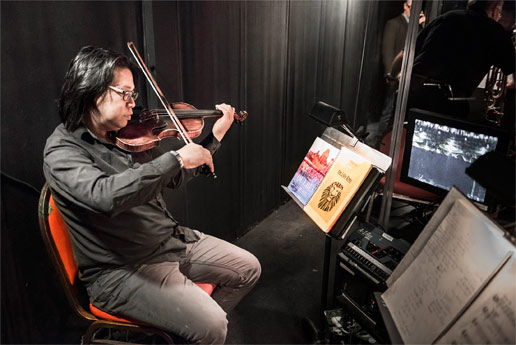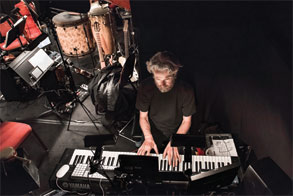From the Theatre, Touring, and Booking Division
The Broadway League announced in late June that Broadway performances in New York City will be suspended through the remainder of 2020 due to COVID-19. Returning productions are currently projected to resume performances over a series of rolling dates in early 2021.
As we navigate through the current pandemic and the total shutdown of live theatrical performance, it is important to think ahead and consider what our industry will look like as we prepare for a return to work in the theatre pits across the United States and Canada.
For the last several weeks, I have been working with the officers of the Theatre Musicians Association—President Tony D’Amico, Vice President Heather Boehm, and Secretary Treasurer Mark Pinto—and the Director of Broadway Jan Mullen to evaluate the needs of theatre musicians for a safe return to work.
We will be faced with many challenges in ensuring musicians performing in the theatre pit environment remain safe and healthy. Below is a list of questions and issues that we believe will be important to address with our employers as we emerge from the current crisis. We offer these as a guideline for the bargaining of safety protocols for musical theatre. Please do not hesitate to contact me with any questions or comments: tgagliardi@afm.org.
Questions to Consider While Bargaining a COVID-19 Safety Plan for the Musical Theatre Workplace:
All the items below are subject to collective bargaining and can be addressed in COVID-19 side letters to avoid opening the agreement and keep bargaining confined to safety protocols. As with any change negotiated in a collective agreement, side letters must be ratified by the bargaining unit before musicians return to work. Musicians should only return to work after the union has determined that the employer has met its obligation to provide for a safe and healthy work environment.
All the below items should be considered for load-in, load-out, sound-check, rehearsals, and performances.
A coordinated response to health and safety procedures between the AFM, Actors Equity, and the International Alliance of Theatrical Stage Employees (IATSE) will ensure consistent guidelines for our workplaces. All theatres should establish safety committees and compliance officers to monitor that sanitation, ventilation, social distancing protocol, and Personal Protective Equipment (PPE) are in accordance with best practices and legal requirements. Employees are not responsible for establishing these protocols and should not shelter the employers from liability. No worker should sign a liability waiver as a condition of returning to the theatre or any other workplace.
Under no circumstances should COVID-19 reopening procedures be used to change or diminish instrumentation or run of show by electronic or any other means.
20 QUESTIONS TO CONSIDER:
- How will the special challenges of placement in the pit be resolved?
- Protection against contamination from singers/dancers above the pit.
- Ventilation challenges in close quarters.
- Will musicians and staff, as well as vendors and anyone else entering the workplace, be trained in the agreed-upon safety protocols?
- What must change with regard to sanitation?
- Placement of hand sanitizer and/or disinfectant wipes.
- Containers/absorbent material for wind and brass condensation/spit and proper disposal of same.
- Prohibition of food and drink in shared spaces.
- More frequent cleaning and sanitizing of all facilities.
- For more info, visit: www.osha.gov/Publications/OSHA3990.pdf
- Will employees receive health screenings prior to entering the workplace?
- Testing, for either infection or antibodies.
- Temperature screenings.
- Local musicians who exhibit symptoms of COVID-19 should inform their union steward, contractor, and local union officers. Traveling musicians shall inform their union steward and company management.
- Anyone who has symptoms consistent with COVID-19 should stay home and get tested. No musician who stays home due to symptoms should lose wages, sick pay, or sick leave. This should apply to subs as well as chairholders. In the US, the Families First Coronavirus Relief Act (FFCRA) provides for paid leave in these and other circumstances. More information here: www.dol.gov/agencies/whd/pandemic/ffcra-employer-paid-leave.
- Anyone who has tested positive for COVID-19 should remain at home, away from the workplace, until cleared to return to work by a medical professional. The employer should assist in contact tracing to identify any other employee who may have been exposed to the infected worker. The AFM local, union steward, and company management should be informed immediately of any infection that occurs in connection with the workplace and any potential exposure.
- If a family member of a musician or other worker contracts COVID-19, the individual should stay at home and quarantine until it is clear they have not become infected. The FFCRA provides paid leave in the case of employees.
- In the circumstances of the pandemic and community spread, employers are permitted to ask employees about their symptoms and perform certain temperature and health checks on employees. The employer must continue to keep all employee health information confidential and store it in a file separate from other personnel records. More information can be found online here: www.eeoc.gov/wysk/what-you-should-know-about-covid-19-and-ada-rehabilitation-act-and-other-eeo-laws.
- How will the employer provide support allowing musicians to travel safely to and from the theatre, particularly in cities where public transportation is the normal mode of travel or when company housing is farther than one-half mile from the venue? Will employers secure free or discounted parking in close proximity to the theater, so as to allow musicians to avoid public transportation or ride share services?
- Will masks be required of everyone in the workplace?
- Will the employer provide PPE (masks and gloves)? What kind?
- When will brass and wind players remove masks to play?
- Where will masks be kept when not being worn?
- Will new masks be available to musicians on double service days?
- Will visitors be prohibited from entering backstage/pit areas?
- How will musicians and others in the workplace maintain proper distancing offstage from their arrival to departure? How will traffic flow be managed, and workplace capacity limited, in all of the following areas:
- Parking Lot • Entry to the theatre/Stage Door • Security checks • Backstage/Onstage/Pit areas • Hallways • Green rooms and lounges • Dressing rooms • Locker rooms/Instrument storage room/Trap Room/Case storage • Restrooms • Offices
- Where will musicians place their cases?
- Where will musicians warm up?
- How will food and drink be handled?
- Water fountains? Bottled Water? • Eating in shared spaces? • No communal food?
- How will music be prepared and distributed safely?
- Adjustments to rental and touring music distribution procedures to protect performers.
- PDFs of advance books.
- Touring librarian safety in handling returned parts and rental parts.
- Encourage iPad or EStand technology.
- How will musicians be physically spaced for rehearsing and performing?
- Routes for travel to the performing/workspace.
- Spacing in performing/workspace.
- One person per stand, even for strings.
- Barriers between musicians—plexiglass or other materials.
- Barriers between workspace and audience.
- Conductor placement.
- How will musicians document and report instances of discrimination because of ageism, immunocompromised status, caretaker status, or personal comfort level?
- How will normally shared equipment be managed to avoid contamination?
- Chairs • Music stands • Percussion equipment • Keyboards • Books/Parts • Headphones • Avioms or other personal audio monitoring systems • Laptop rig/Mainstage • Shared instruments for subs.
- When large instruments, travel cases, and other equipment are moved who will move them? What will be done to protect against contamination of people and instruments?
- Will normal timing of rehearsals need to be adjusted?
- To limit time exposed to others in the same space.
- To extend break time to allow safe (staggered) use of restroom facilities.
- To create breaks to allow for proper and complete ventilation of rehearsal and performance areas.
- Will the theatre need to be updated or retrofitted?
- HVAC and air filtration • No-touch door opening • Elimination of blowing hand dryers • Installation of hand sanitizing stations.
- What restrictions must be in place for the audience and front of house in order to protect workers?
- Distance from the front of the stage to the audience.
- Audience members and ushers required to wear face masks.
- Suspension of onstage/backstage tours and pit visits.
- Temperature checks or other screenings for audience members.
- Will you need to address travel-related concerns for out-of-town musicians?
- Ability to travel across borders (state or national).
- Housing (single vs. double occupancy) in hotel or with company.


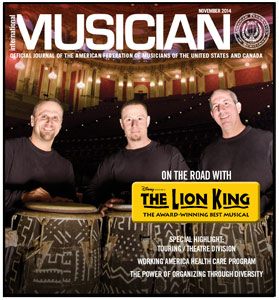
 At any given week each year, there are an average of 150 full-time AFM musicians touring throughout the US and Canada, in 20-plus musicals and three circuses. In addition to these traveling artists, touring shows provide part-time employment to hundreds of local musicians. Most productions travel with only a small core group of musicians, and they fill out the rest of the score with a “new” orchestra of local homegrown talent in each venue. Along with peer unions Actors’ Equity and The International Alliance of Theatrical Stage Employees (IATSE), the AFM has theatrical touring agreements that address short-engagement tours, which play primarily in smaller markets, as well as big budget blockbusters booked in major cities for weeks on end. Main employers—members of The Broadway League and Disney Theatricals—are signed to the AFM’s Pamphlet B Agreement, which also incorporates the Short Engagement Tour (SET) Agreement. Smaller nonsignatory producers sign single-project touring agreements, which largely mirror the AFM’s SET terms. Touring under the Pamphlet B agreement, Disney’s The Lion King is reigning king of the road musical jungle, having traveled continuously since 2002 and given more than 5,000 performances. For the most part, the 13 musicians traveling with The Lion King consider themselves fortunate to have full-time, well-paid, secure jobs in music that allow them to see the country. However, the life of a traveling musician is also wrought with unique challenges. In this article you will meet seven AFM musicians who travel with The Lion King, and learn about their lives on the road. Unlike their counterparts on the orchestral podium, conductors are covered employees in the unionized workplaces of musical theatre and circus productions. They often rise to the post through their work as pit keyboard players—and some are required to play and conduct at the same time. Their role of preparing the music for the show takes on increased importance considering the need to rehearse a different set of musicians to play complicated scores, in a limited time, every time the show changes venue. The Lion King score calls for six local musicians, in addition to the 13 who travel with the show.
At any given week each year, there are an average of 150 full-time AFM musicians touring throughout the US and Canada, in 20-plus musicals and three circuses. In addition to these traveling artists, touring shows provide part-time employment to hundreds of local musicians. Most productions travel with only a small core group of musicians, and they fill out the rest of the score with a “new” orchestra of local homegrown talent in each venue. Along with peer unions Actors’ Equity and The International Alliance of Theatrical Stage Employees (IATSE), the AFM has theatrical touring agreements that address short-engagement tours, which play primarily in smaller markets, as well as big budget blockbusters booked in major cities for weeks on end. Main employers—members of The Broadway League and Disney Theatricals—are signed to the AFM’s Pamphlet B Agreement, which also incorporates the Short Engagement Tour (SET) Agreement. Smaller nonsignatory producers sign single-project touring agreements, which largely mirror the AFM’s SET terms. Touring under the Pamphlet B agreement, Disney’s The Lion King is reigning king of the road musical jungle, having traveled continuously since 2002 and given more than 5,000 performances. For the most part, the 13 musicians traveling with The Lion King consider themselves fortunate to have full-time, well-paid, secure jobs in music that allow them to see the country. However, the life of a traveling musician is also wrought with unique challenges. In this article you will meet seven AFM musicians who travel with The Lion King, and learn about their lives on the road. Unlike their counterparts on the orchestral podium, conductors are covered employees in the unionized workplaces of musical theatre and circus productions. They often rise to the post through their work as pit keyboard players—and some are required to play and conduct at the same time. Their role of preparing the music for the show takes on increased importance considering the need to rehearse a different set of musicians to play complicated scores, in a limited time, every time the show changes venue. The Lion King score calls for six local musicians, in addition to the 13 who travel with the show.